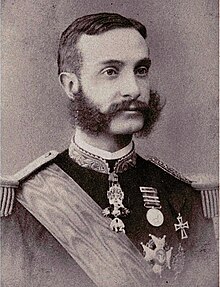Alfonso XII
| King Alfonso XII | |
|---|---|
 |
|
| King of Spain (more...) | |
| Reign | 29 December 1874 – 25 November 1885 |
| Predecessor | (Queen Isabella II) Prince Amadeo, Duke of Aosta: as Usurper King of Spain Francisco Serrano as President of the Republic |
| Successor | King Alfonso XIII |
| Prime Ministers | |
| Born |
28 November 1857 Madrid, Spain |
| Died | 25 November 1885 (aged 27) Madrid, Spain |
| Burial | El Escorial |
| Spouse |
Princess Mercedes de Orléans of France (m. 1878 - 1878; her death) Archduchess Maria Christina of Austria (m. 1879 - 1885; his death) |
| Issue more... |
Infanta Mercedes, Princess of Asturias Infanta Maria Teresa King Alfonso XIII of Spain (born posthumously) |
| House | Bourbon |
| Father | Infante Francis, Duke of Cádiz |
| Mother | Queen Isabella II of Spain |
| Religion | Roman Catholic |
Alfonso XII (Alfonso Francisco de Asís Fernando Pío Juan María de la Concepción Gregorio Pelayo; 28 November 1857 – 25 November 1885) was King of Spain, reigning from 1874 to 1885, after a coup d'état restored the monarchy and ended the ephemeral First Spanish Republic.
Having been forced into exile after the Glorious Revolution deposed his mother Isabella II from the throne in 1868, Alfonso studied in Austria and France. His mother abdicated in his favour in 1870, and he returned to Spain as king in 1874 following a military coup. Alfonso died aged 27 in 1885, and was succeeded by his unborn son, who became Alfonso XIII on his birth the following year.
Alfonso was born in Madrid as the eldest son of Queen Isabella II. Officially, his father was her husband, Infante Francis. Alfonso's biological paternity is uncertain: there is speculation that his biological father may have been Enrique Puigmoltó y Mayans (a captain of the guard). These rumours were used as political propaganda against Alfonso by the Carlists.
His mother's accession created the second cause of instability, which was the Carlist Wars. The supporters of the Count of Molina as king of Spain rose to have him enthroned. In addition, within the context of the post-Napoleonic restorations and revolutions which engulfed the West both in Europe and the Americas, both the Carlistas as well as the Isabelino conservatives were opposed to the new Napoleonic constitutional system. Much like in Britain, which subtracted itself from the liberal constitutional process, Spanish conservatives wanted to continue with the Traditional Spanish Organic Laws such as the Fuero Juzgo, the Novísima Recopilación and the Partidas of Alfonso X. This led to the third cause of instability of note, the "Independence of the American Kingdoms", recognized between 1823 and 1850.
...
Wikipedia
